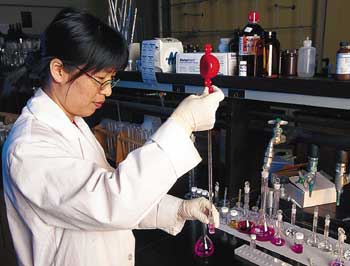Alabama’s Agriculture Department – Keeping Our Food Safe

Ever wonder if that pound of cheese you bought in the grocery store really weighs a pound? Or if that gallon of gasoline at the service station really measures out to be a gallon? Or if you really are getting 93-octane gasoline? Or, more importantly, if your food is free of chemical residue or any other contaminants?Most people don’t realize it is the State Department of Agriculture’s role to answer these questions and that it affects everyone on a daily basis, not just farmers. The many responsibilities of the department make the election on Nov. 5 for a new commissioner of agriculture important for farmers and consumers alike. In fact, one of the candidates for the job, Ron Sparks, is campaigning on the theme, “Nothing is more important than the safety of our food supply.” Commissioner Charles Bishop, who is not seeking re-election, and Sparks, who is currently assistant commissioner of agriculture, have almost doubled the number of department inspectors in the past four years. Just this past year, the department discovered outdated baby food on some grocery shelves. It removed over 10,000 containers of expired infant formula and baby food. It removed 12,000 packages of outdated meat products and 10,000 date-expired dairy products.The department also banned the sale of six brands of imported shrimp and crawfish that tested positive for a restricted antibiotic. And the commissioner quarantined 17 containers of used tractors that arrived in the Port of Mobile from England, where there had been 240 outbreaks of foot-and-mouth disease.Food samples are collected from the retail market for analysis. The Agricultural Department lab studies these samples for preservatives, proper content labeling, and specific product standards to ensure they are safe. Also checked are the fat, moisture and protein content of ground beef, pork, poultry and various cooked products to make sure they are in compliance and consistent with label declarations. When an inspector stops in at a grocery store, he may randomly check to determine expiration dates of foods, accuracy of all weights (a huge store may have 30 different scales), and the accuracy of price code scanners. Price scans are randomly checked on about 2.5 million items with about 1 percent found in error, according to Steadman Hollis, the department’s director of lightweights and measures.Hollis said increasing the number of inspectors has greatly enhanced their enforcement capabilities. The incidence of fuel violations is now well below the national average, he said. “Our division’s function is to make sure the consumer gets what he pays for,” said Hollis.Each time a consumer purchases a product based on weight, measure or count, the weighing or measuring device must be certified as accurate by the Department of Agriculture. Hollis estimates there are 100,000 gasoline and diesel pumps in Alabama and each one must, by law, be tested annually for accuracy.When illegal or inaccurate devices are found, they are condemned and marked with a red tag until the pump is repaired or replaced. When voters decide on Nov. 5 who will be their commissioner of agriculture for the next four years, it is important to Alabama’s 47,000 farmers. But it’s equally important to the other 4.4 million residents who want to make sure their food is safe and that the products they buy are as the label describes.
